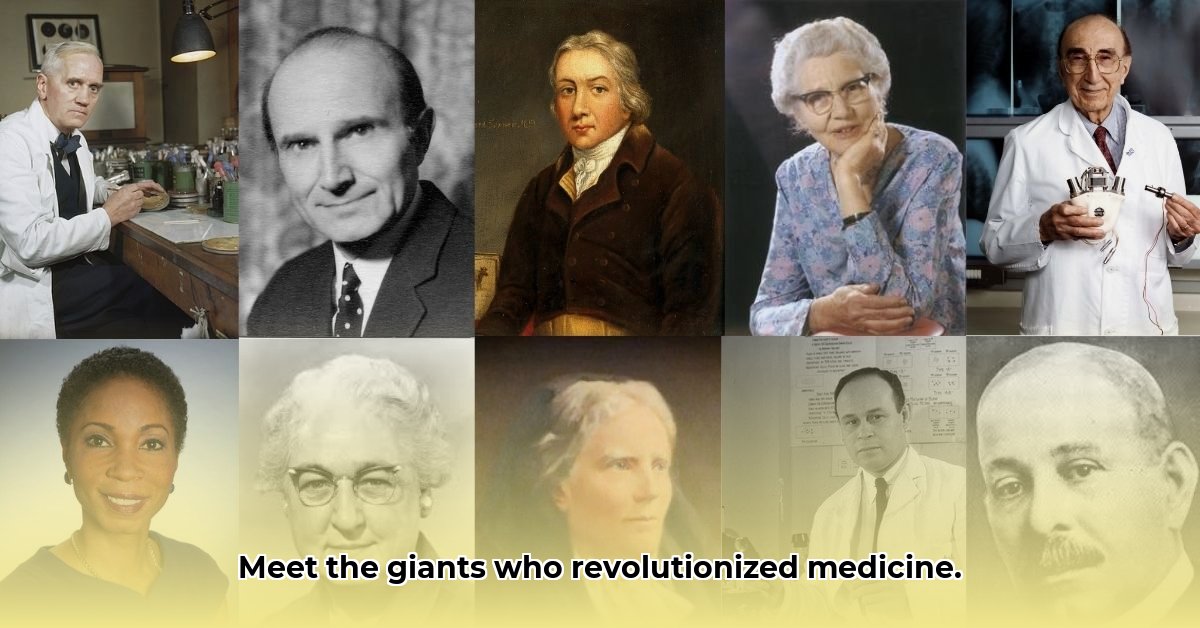Medicine’s evolution is a tapestry woven with the threads of countless dedicated individuals. This article delves into the groundbreaking contributions of both renowned figures and unsung heroes who have revolutionized healthcare, exploring their impact on disease eradication, global health equity, technological advancements, and the critical realm of pediatric care, particularly in developing nations.
A Legacy of Innovation: Shaping the Medical Landscape
From the eradication of smallpox to the development of life-saving surgical procedures, medical pioneers have transformed the healthcare landscape. Their unwavering commitment to research, innovation, and patient care continues to inspire generations of medical professionals.
- Transformative Discoveries: These pioneers have deepened our understanding of disease, leading to innovative treatments and diagnostic tools. Their discoveries have fundamentally altered the trajectory of medicine, paving the way for a healthier future.
- Global Health Equity: Recognizing the disparities in healthcare access, these individuals have dedicated their careers to serving underserved communities, advocating for equitable access to quality care for all.
- Technological Integration: Embracing technological advancements, these innovators have integrated cutting-edge tools to enhance patient care. From the development of the defibrillator to the rise of AI-powered diagnostics, their contributions have modernized medicine and improved patient outcomes.
Medical Giants and Their Enduring Impact
Vaccination: A Triumph of Prevention
Edward Jenner’s pioneering work on the smallpox vaccine not only eradicated a devastating disease but also laid the foundation for modern immunology. Jonas Salk’s development of the polio vaccine further solidified the transformative power of vaccination, preventing widespread paralysis and significantly improving public health. These achievements highlight the profound impact preventive medicine can have on global health. Paul Offit, a contemporary champion of vaccination, continues this legacy by developing and advocating for numerous vaccines that protect children from preventable illnesses.
Global Health Equity: A Pursuit of Justice
Championing health equity, individuals like Paul Farmer have dedicated their careers to providing healthcare to the most vulnerable populations, notably in Haiti. His work emphasizes the critical need for accessible and culturally sensitive healthcare in resource-limited settings. Devi Shetty’s innovative approach to cardiac care in India has made life-saving procedures more affordable and accessible, demonstrating the potential of scalable healthcare solutions. Agnes Binagwaho’s leadership in reforming Rwanda’s healthcare system underscores the importance of sustainable infrastructure and community-based care in achieving health equity.
Technological Advancements: Reshaping Medical Practice
Technological innovations have revolutionized medical practice. The invention of the defibrillator by Claude Beck provided a life-saving intervention for cardiac arrest, dramatically improving survival rates. Charles Drew’s pioneering work in blood storage and transfusion techniques has made this life-saving procedure safer and more readily available. Furthermore, the ongoing development of AI-powered tools offers unprecedented opportunities for early disease detection, personalized treatment plans, and improved healthcare delivery.
Revolutionizing Pediatric Care: A Focus on Vulnerable Populations
Daycare Clinics: A Community-Based Solution
The daycare clinic model has emerged as a cost-effective and accessible alternative for treating childhood pneumonia in developing countries. By providing timely and effective treatment within communities, these clinics reduce the burden on overcrowded hospitals and improve outcomes for children in resource-limited settings. This innovative approach emphasizes the importance of community-based healthcare solutions, enabling timely interventions and improved access to care.
AI: Transforming Pediatric Care
Artificial intelligence is rapidly transforming pediatric care. From predicting disease outbreaks to providing personalized breastfeeding support, AI-powered tools offer promising solutions for enhancing children’s health. Early disease detection through AI algorithms has the potential to significantly improve outcomes, particularly in underserved communities. However, careful consideration of ethical concerns related to data privacy and algorithmic bias is paramount to ensure responsible and equitable implementation of these technologies.
Beyond the Well-Known: Recognizing Unsung Heroes
While the contributions of prominent figures are widely celebrated, it’s crucial to acknowledge the unsung heroes whose work has also shaped medical progress. These individuals, often working behind the scenes, have made significant contributions to research, patient care, and healthcare innovation. Unearthing their stories requires dedicated research, exploring diverse sources like regional medical publications, historical archives, and personal accounts. Recognizing and celebrating their contributions enriches our understanding of medical history and honors the collaborative nature of scientific advancement. Through meticulous research and storytelling, we can bring their invaluable contributions to light and celebrate the collective effort that drives medical progress.
- Red Cloud, NE: Discover Willa Cather’s Legacy - April 11, 2025
- Remember Old Social Media Sites? Their Rise and Fall - April 11, 2025
- How many days till Feb 3?Accurate Countdowns & Tools - April 11, 2025
















